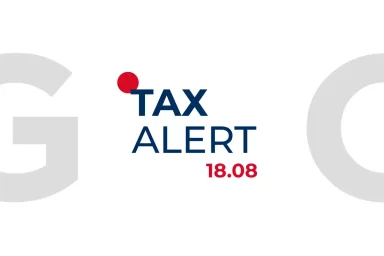Proposed tax changes to regulate the turnover of virtual assets in Ukraine
Contents
The purpose of the Draft Law is to regulate the turnover of virtual assets in Ukraine, ensuring their legal use, taxation and protection of the rights of market participants.
The Draft Law provides for amendments to the Tax Code of Ukraine (the “Tax Code”) and a number of other regulatory acts. In this article, we suggest to take a closer look at the proposed key amendments to the Tax Code.
Definitions of concepts related to virtual assets
The Tax Code introduces the concept of “virtual assets”.
Thus, individually identifiable virtual assets are virtual assets that are indivisible, individually identifiable in the form of unique, irreplaceable digital content that can be transferred and stored using distributed ledger technology or other similar technology and that may contain a digital representation of intellectual property or a link to it.
The Draft Law also clarifies the concepts of “supply of services” and “supply of goods”.
For the purposes of taxation, the supply of services, in particular, is proposed to be considered the supply of services related to the turnover of virtual assets. The sale, exchange or other alienation of virtual assets will also be considered the supply of goods.
Accounting for transactions with virtual assets
The Draft Law provides that suppliers of services related to the turnover of virtual assets must register with the supervisory authority within 60 calendar days after commencing service provision to residents of Ukraine, and annually submit a report on transactions with virtual assets for the previous calendar year to the supervisory authority by 31 January.
It also provides for the introduction of fines, in particular, for failure to register (20 minimum wages) and failure to submit or late submission of a report on transactions with virtual assets (100 minimum wages for failure to submit the report and 0.5 minimum wages (but not more than 100 minimum wages) for each calendar day of late submission).
It is proposed to apply these fines in reduced amounts during the transition period, namely for violations committed in 2026-2029.
Taxation of transactions with virtual assets for individuals
The Draft Law proposes that an individual taxpayer must independently keep records of the financial result of transactions with virtual assets, separately from other income and expenses. It also introduces self-declaration, which means that the individual is responsible for the declaration.
It is established that the object of personal income tax (“PIT”) means profit from transactions with virtual assets (positive financial result for the year: income from sales minus documented expenses allowed to be taken into account).
To determine profit, the sale will be considered as sale of virtual assets for money or any other transactions that involve the transfer of ownership of virtual assets (alienation) in exchange for currency values / goods / services.
It is proposed to make deductible documented expenses amounts of expenses in monetary and/or other property form, in particular, the purchase of asset-linked tokens, digital money tokens, payment of remuneration to service suppliers related to the turnover of virtual assets.
The PIT rate on profits from transactions with virtual assets is proposed to be set at 18%. At the same time, income from the sale of virtual assets acquired in previous periods (before the law on the basis of the Draft Law comes into force) may be included in the 2026 tax declaration and will be taxed at a reduced PIT rate of 5%.
In addition, it is envisaged that the exchange of one virtual asset for another; income received from the alienation of virtual assets during the year that does not exceed the amount of one minimum wage; and receiving of virtual assets as a result of the issue or free receipt in exchange for personal data will not be subject to taxation.
Corporate income taxation
The Draft Law proposes to introduce new differences for adjusting the financial result of transactions with virtual assets for legal entities. The approach to the taxation of such transactions is envisaged to be similar to the approach used in the taxation of transactions with securities.
It is established that the financial result (profit or loss) from transactions on the sale or other alienation of virtual assets is defined as the amount of income received from the sale or other alienation of virtual assets, reduced by the value of virtual assets.
The sale of virtual assets means both a sale for money and an exchange or any other transaction that results in the transfer of ownership.
VAT on transactions with virtual assets
The Draft Law stipulates that transactions involving the issue, placement, sale, exchange, or other alienation of virtual assets or the redemption of virtual assets are not subject to VAT.
However, certain exceptions to this are provided for. Thus, the above transactions will be subject to VAT if they relate to virtual assets that are individually identifiable or not tied to assets or digital money and certify the right to demand the transfer of property or the provision of services.
Conclusion
In summary, the Draft Law actually launches the virtual assets market and establishes clear rules for their administration and taxation for individuals and legal entities.
If the Draft Law is adopted, it is expected that the aforementioned amendments to the Tax Code will take effect on January 1, 2026.

Tetiana Fedorenko
Senior Associate, Attorney at law
- Contacts
- 31/33 Kniaziv Ostrozkykh St, Zorianyi Business Center, Kyiv, Ukraine, 01010
- t.fedorenko@golaw.ua
- +380 44 581 1220
Get in touch
To get a consultation, please fill out the form below or call us right away:Sign up to be aware
New achievements are inspired by information. GO further, don’t miss out GOLAW news and legal alerts
Our expertise
-
- Energy and Natural Resources
- Antitrust and Competition
- Banking and Finance
- Compliance, Corporate Governance and Risk Management
- Corporate and M&A
- Criminal and White Collar Defence
- Defense in Anti-corruption procedures and regulations
- Labor and Employment
- Natural Resources and Environment
- Government Relations (GR)
- Insolvency and Corporate Recovery
- Intellectual property
- International trade
- Legal support of business and private Сlients in Germany
- Litigation and dispute resolution
- Private clients
- Real Estate and Construction
- Restructuring, Claims and Recoveries
- Martial Law
- Tax and Customs
-
- Agribusiness
- Aviation
- Chemical industry
- Engineering, Construction and Building Materials
- Natural Resources and Environment
- Financial institutions
- IT and AI
- Industry and manufacturing
- Healthcare industries, Life sciences and Pharmaceuticals
- Media, Entertainment, Sports and Gambling
- Retail, FMCG and E-Commerce
- Transport and Logistics
We use cookies to improve performance of our website and your user experience.
Cookies policy
Cookies settings







